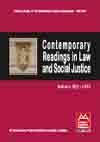HUMAN RIGHTS REQUIRE “COSMOPOLITAN CONSTITUTIONALISM” AND COSMOPOLITAN LAW FOR DEMOCRATIC GOVERNANCE OF PUBLIC GOODS
HUMAN RIGHTS REQUIRE “COSMOPOLITAN CONSTITUTIONALISM” AND COSMOPOLITAN LAW FOR DEMOCRATIC GOVERNANCE OF PUBLIC GOODS
Author(s): Ernst-Ulrich PetersmannSubject(s): Law, Constitution, Jurisprudence
Published by: Addleton Academic Publishers
Keywords: constitutional pluralism; cosmopolitan constitutionalism; European Court of Human Rights; European Free Trade Area Court; EU Court of Justice; European law; human rights; international economic law; judicial governance; legal methodologies
Summary/Abstract: The more “globalization” transforms “national public goods” demanded by citizens into transnational “aggregate public goods,” the stronger becomes the need for reviewing “Westphalian governance failures” and related “legal methodologies” (Section 1). Resolving the “constitutional problems” and “collective action problems” of multilevel governance (e.g. in terms of constituting, limiting, regulating and justifying multilevel governance powers, participation and representation of citizens in governance and dispute settlement, rule of law protecting cosmopolitan rights) requires supplementing national Constitutions by “multilevel cosmopolitan constitutionalism” empowering citizens and multilevel governance institutions to realize their collective responsibility for protecting human rights, rule of law and other interdependent public goods across frontiers (Section 2). The prevailing “political realism” and “constitutional nationalism” neglect the customary law requirements of interpreting international treaties and settling disputes “in conformity with the principles of justice and international law,” including “human rights and fundamental freedoms for all,” in order to limit democratic accountability of governments (Section 3). Human rights and multilevel protection of “principles of justice” require cosmopolitan law based on constitutional, “public choice” – and economic regulatory strategies limiting multilevel “governance failures” as well as “market failures” (Section 4). The human rights obligations of all UN member states limit governmental “margins of appreciation” in dealing with economic crises and related austerity programs (Section 5). Governments and courts of justice must reconcile and “balance” civil, political, economic, social and cultural rights depending on their diverse “contexts of justice” and protect transnational rule of law not only in terms of rights and obligations of governments, but also as cosmopolitan rights of citizens as “agents of justice” and “democratic owners” of all governance institutions (Section 6).
Journal: Contemporary Readings in Law and Social Justice
- Issue Year: V/2013
- Issue No: 2
- Page Range: 90-119
- Page Count: 30
- Language: English
- Content File-PDF

